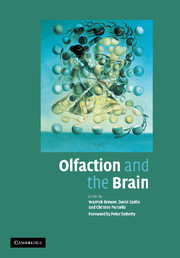Book contents
- Frontmatter
- Contents
- Foreword
- Preface
- List of Contributors
- Section I Neurology, Neurophysiology and Neuropsychology: Olfactory Clues to Brain Development and Disorder
- Section II Social Functioning: Role of Evolution, Genetics and Gender
- 8 Primate Olfaction: Anatomy and Evolution
- 9 Genetics and Family Influences on Olfaction: A Focus in Schizophrenia
- 10 Sex Differences and Olfactory Function
- 11 The Role of Pheromones and Chemistry: Lessons from Comparative Anatomy
- 12 The Impact of Olfaction on Human Social Functioning
- Section III Assessment and Disorders of Olfaction
- Index
- Plate section
- References
9 - Genetics and Family Influences on Olfaction: A Focus in Schizophrenia
from Section II - Social Functioning: Role of Evolution, Genetics and Gender
Published online by Cambridge University Press: 17 August 2009
- Frontmatter
- Contents
- Foreword
- Preface
- List of Contributors
- Section I Neurology, Neurophysiology and Neuropsychology: Olfactory Clues to Brain Development and Disorder
- Section II Social Functioning: Role of Evolution, Genetics and Gender
- 8 Primate Olfaction: Anatomy and Evolution
- 9 Genetics and Family Influences on Olfaction: A Focus in Schizophrenia
- 10 Sex Differences and Olfactory Function
- 11 The Role of Pheromones and Chemistry: Lessons from Comparative Anatomy
- 12 The Impact of Olfaction on Human Social Functioning
- Section III Assessment and Disorders of Olfaction
- Index
- Plate section
- References
Summary
Introduction
Family or genetic ‘high-risk’ studies have described olfactory deficits in asymptomatic or non-fully symptomatic first-degree relatives (siblings, offspring, parents) of individuals diagnosed with a variety of neuropsychiatric diseases, including Alzheimer's disease (Schiffman et al., 2002; Serby et al., 1996), Parkinson's disease (Berendse et al., 2001; Montgomery et al., 1999), Progressive Supranuclear Palsy (Baker & Montgomery, 2001), and schizophrenia (Kopala et al., 1998; 2001; Moberg et al., 1996; Turetsky et al., 2003). The reader is referred to Chapters 13, 14 and 16 for further discussion of olfaction in Parkinsonian disorders and schizophrenia respectively. Such findings tempt a host of questions, which suggest that the assessment of olfaction in studies of persons at risk for illness has the potential to open the ‘window to the mind’ even wider ….
The study of olfaction as a biological marker or risk indicator for illness is in its infancy compared to established strategies such as studies of attention (Cornblatt & Keilp, 1994). However, a number of issues are raised by the presence of olfactory abnormalities in first-degree biological relatives. Does olfactory functioning provide clues to the genetic underpinnings of complex neuropsychiatric diseases? Can it represent a biological marker for a compromised neural system? If so, what role does it play within the relationship between genes, environmental influences and the clinical manifestations of neuropsychiatric illnesses?
Keywords
- Type
- Chapter
- Information
- Olfaction and the Brain , pp. 167 - 182Publisher: Cambridge University PressPrint publication year: 2006

